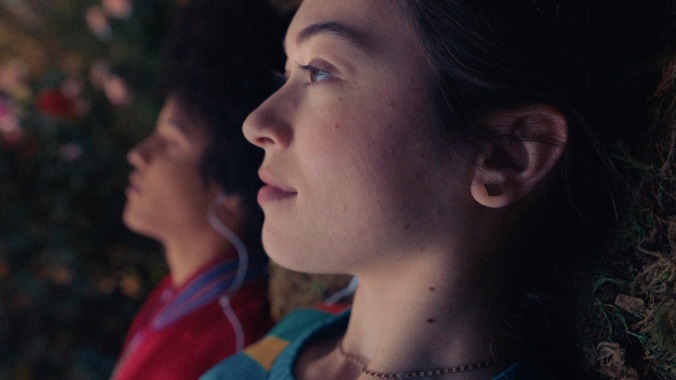The Sky Is Everywhere—and so are the clichés in this well-meaning YA tearjerker
Josephine Decker misplaces the bite of Shirley and Madeline’s Madeline

One way to look at The Sky Is Everywhere, Josephine Decker’s adaptation of a YA bestseller by Jandy Nelson, is as a caring response to two years of relentless tragedy. Did the director glance around and think that what we all really needed right now is an optimistic, whimsical take on grief? Maybe she thought it could function as a life preserver for those drowning in it.
Like its source material, the film tells the story of high school student and gifted clarinetist Lennie (Grace Kaufman), who lost her mother when she was young, and now lives with her grandmother (Cherry Jones), her Uncle Big (Jason Segel), and her older sister, Bailey (Havana Rose Liu). In the opening minutes, tragedy strikes this unlucky family again, as Bailey drops dead of a fatal arrhythmia during a rehearsal of Romeo And Juliet.
Shattered by the loss, Lennie retreats from family, friends, and her clarinet. “She moved through the world like music,” she says of her beloved, departed sister. “There’s no more music in me.” Eventually, slowly, she begins to seek solace—first in dreamy fellow musician Joe (Jacques Colimon), then more problematically with her sister’s devastated boyfriend, Toby (Pico Alexander), who of course can feel her pain, as someone who knows the “architecture” of her grief and can share it.
Decker goes full magical realism on Lennie’s world, using whimsical flourishes to suggest her shifting perspective. At times, the giant, dusty, jewel-toned house she lives in feels plucked straight from Encanto. It’s not so far removed from the lightly surreal touches in Decker’s other movies, though the palette is much different: all bright primary colors, sometimes rather childish, other times like a beautiful tribute to Julie Taymor’s excesses. It’s all fantastically realized—Decker seems to be able to bend light to her will, and has it flowing through frames as luminescent rivers. She’s most in her element when filling the screen with metaphors for grief, like wilting leaves or sadness manifesting as rainclouds forming over the characters’ heads.
As lovely and unique as all that is, much of the rest of The Sky Is Everywhere is overfamiliar and cloying. The peppy best friend, the quirky stoner uncle, the gorgeous mean girl, the intensely loving grandmother who arranges breakfasts into smiley faces—these are supporting characters we’ve seen a million times before. Even Lennie carries the regular clichés of YA heroine duty: a love of Wuthering Heights, perfect hair, dreams of getting into Juilliard. (Do screenwriters know there are other performing arts schools?)
There are sweet moments between Lennie and Joe, wide-eyed innocents experiencing the blossoming of first love. (His music hits her as physical waves of adoration.) At times, though, their relationship borders on puerile, the two resembling children playing at adult romance. It’s particularly jarring in contrast to her scenes with smoldering Toby, where the sudden presence of erections feels like an abrupt upping of sexual stakes. Another contrast: how bland and neutered even these scenes appear in comparison to Decker’s earlier work—the parasitic performance art of Madeline’s Madeline, the acerbic psychosexual bite at the dark heart of Shirley. Those were films that boldly explored complicated women and toxic dynamics. Decker defangs herself with The Sky Is Everywhere, which seems to aim for putting something broadly positive in the world but lands on inconsequential.
But then, this is a film for young adults. They are unlikely be so jaded, or to have watched dozens of Juilliard auditions and hundred of apologies to loving grandmothers. For them, there may be something refreshingly subversive about an eccentric uncle lighting a joint and saying “I want to use the sacred geometry of the great pyramids to bring dead bugs back to life!” And maybe it will help some of them process the specific and collective grief of our time, even if the rest of us end of feeling like we’ve been locked in a YA hall of mirrors, surrounded on all sides by familiar sights with a few light distortions.